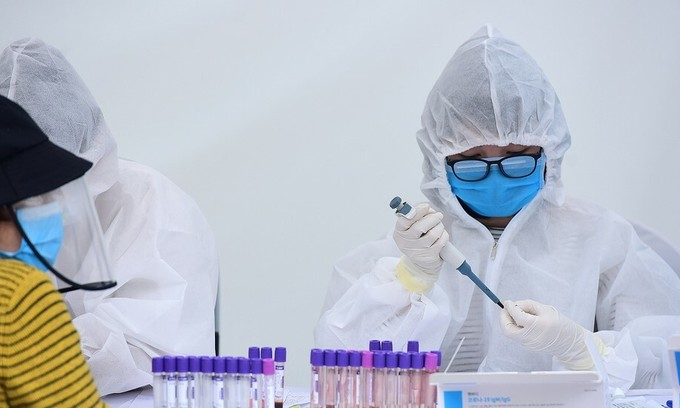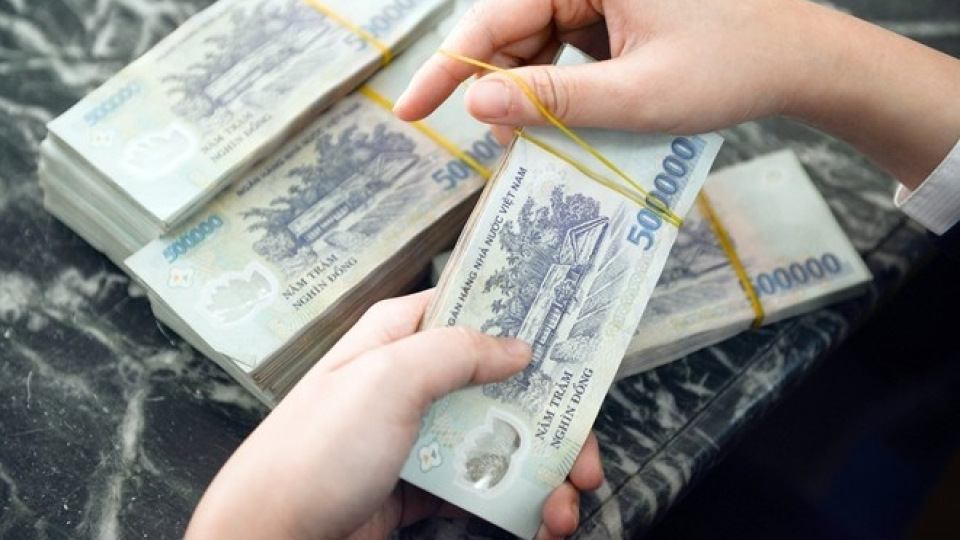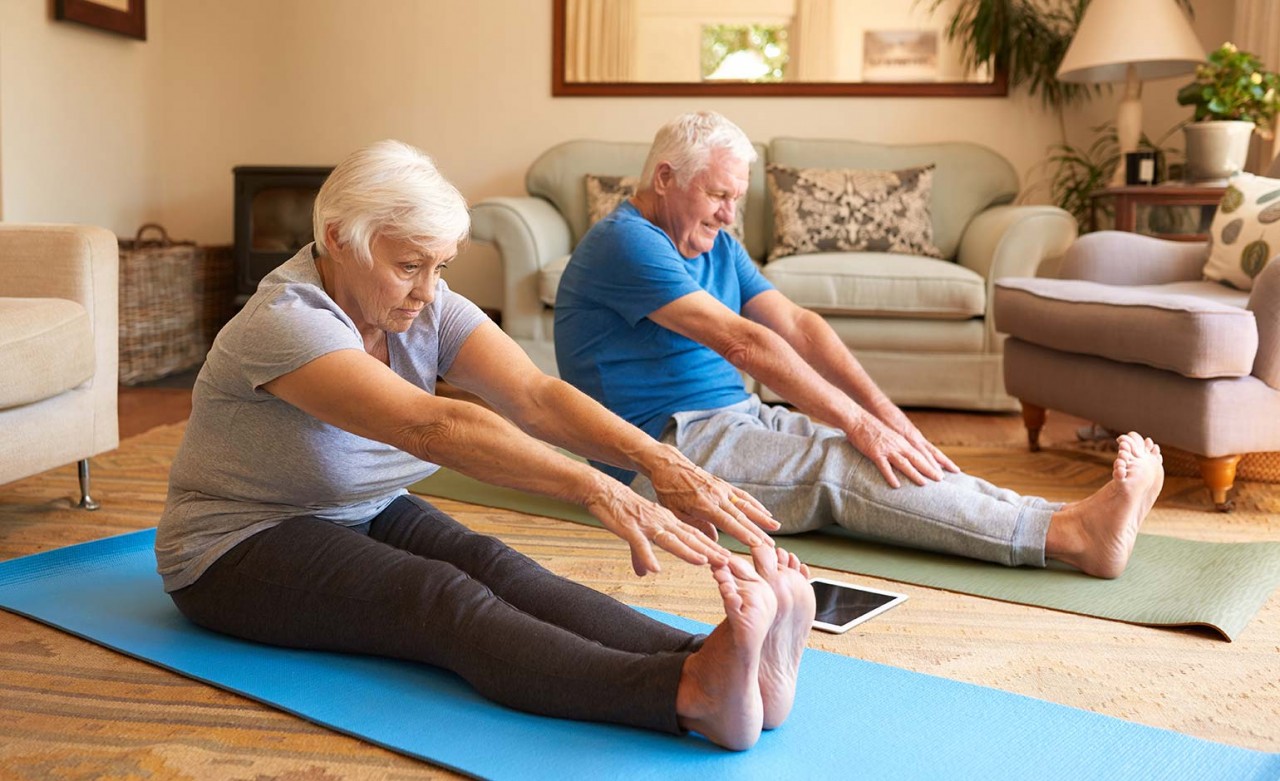COVID-19 lockdown will trigger health impacts, researchers warn
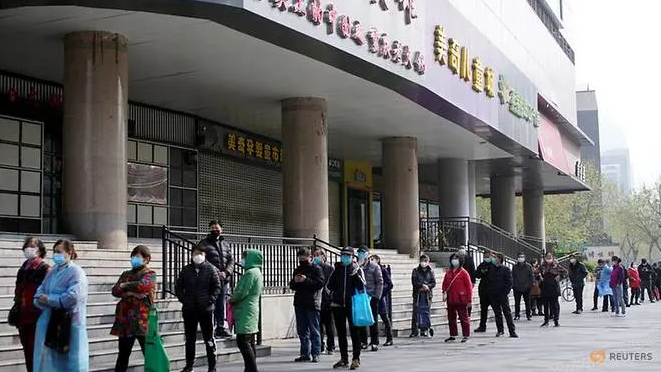 |
| People wearing face masks line up to enter a supermarket in Wuhan, Hubei province, the epicentre of China's coronavirus disease (COVID-19) outbreak, April 1, 2020. |
The medical battle against COVID-19 is developing so rapidly that no one knows how it will play out or what the final casualty count will be. But researchers say history shows that responses to a deep and long economic shock, coupled with social distancing, will trigger health impacts of their own, over the short, mid and long term.
SHORT TERM CONSEQUENCES
Domestic violence
Trapped at home with their abusers, some domestic violence victims are already experiencing more frequent and extreme violence, said Katie Ray-Jones, the chief executive officer of the National Domestic Violence Hotline.
In Hubei province, the heart of the initial coronavirus outbreak, domestic violence reports to police more than tripled during the lockdown. In French, the Government has to house domestic abuse victims in hotels to avoid threats from their own homes. In Spain, there are reports a man killed his wife in front of their children five days into the country's lockdown.
The reason for the increase in domestic violence during this period is thought to be due to the exacerbation of social tensions: disease, death, joblessness, strict control, money shortage, stay-at-home order, etc. But that is not the root. The root of the problem lies in the habit of resolving stress with violence, the disparity in power between genders, and the patriarchal ideology deeply rooted in societies, whether Western or Eastern.
Vulnerable students
Students, parents and teachers all face challenges adjusting to remote learning, as schools nationwide have been closed and online learning has begun.
Some experts are concerned that students at home, especially those living in unstable environments or poverty, will miss more assignments. High school students who miss at least three days a month are seven times more likely to drop out before graduating and, as a result, live nine years less than their peers, according to a Robert Wood Johnson Foundation report.
Among the most vulnerable: Special needs students “benefit the most from highly structured and customized special education,” said Sharon Vaughn, executive director of the The Meadows Center for Preventing Educational Risk at the University of Texas. “This means that they are the group that are most likely to be significantly impacted by not attending school both in the short and long term.”
In New Jersey, Matawan’s Megan Gutierrez has been overwhelmed with teaching and therapy duties for her two nonverbal autistic sons, eight and 10. She’s worried the boys, who normally work with a team of therapists and teachers, will regress. “For me, keeping those communications skills is huge, because if they don’t, that can lead to behavioral issues where they get frustrated because they can’t communicate,” Gutierrez said.
MEDIUM TERM CONSEQUENCES
Soaring suicides
In Europe and the United States, suicide rates rise about 1% for every one percentage point increase in unemployment, according to research published by lead author Aaron Reeves from Oxford University. During the last recession, when the unemployment in the United States peaked at 10%, the suicide rate jumped, resulting in 4,750 more deaths. If the unemployment rate increases to 20%, the toll could well rise.
“Sadly, I think there is a good chance we could see twice as many suicides over the next 24 months than we saw during the early part of the last recession,” Reeves told Reuters. That would be about 20,000 additional dead by suicide in the United States and Europe.
Less than three weeks after extreme suppression measures began in the United States, unemployment claims rose by nearly 10 million. Treasury Secretary Steven Mnuchin warned the rate could reach 20% and Federal Reserve economists predicted as high as 32%. Europe faces similarly dire forecasts.
Some researchers caution that suicide rates might not spike so high. The conventional wisdom is that more people will kill themselves amid skyrocketing unemployment, but communities could rally around a national effort to defeat COVID-19 and the rates may not rise, said Anne Case, who researches health economics at Princeton University. “Suicide is hard to predict even in the absence of a crisis of Biblical proportions,” Case said.
This week, the Air Force Academy in Colorado Springs, Colorado, relaxed its strict social isolation policies after the apparent suicides of two cadet seniors in late March, The Gazette, a Colorado Springs newspaper, reported. While juniors, sophomores and freshmen had been sent home, the college seniors were kept isolated in dorms, and some had complained of a prison-like setting. Now, the seniors will be able to leave campus for drive-thru food and congregate in small groups per state guidelines.
Public health crippled
Local health departments run programs that treat chronic diseases such as diabetes. They also help prevent childhood lead poisoning and stem the spread of the flu, tuberculosis and rabies. A severe loss of property and sales tax revenue following a wave of business failures will likely cripple these health departments, said Adriane Casalotti, chief of government affairs with the National Association of County and City Health Officials, a nonprofit focused on public health.
After the 2008 recession, local health departments in the US lost 23,000 positions as more than half experienced budget cuts. While it’s become popular to warn against placing economic concerns over health, Casalotti said that, on the front lines of public health, the two are inexorably linked. “What are you going to do when you have no tax base to pull from?” she asked.
Carol Moehrle, director of a public health department that serves five counties in northern Idaho, said her office lost about 40 of its 90 employees amid the last recession. The department had to cut a family planning program that provided birth control to women below the poverty line and a program that tested for and treated sexually transmitted diseases. She worries a depression will cause more harm.
“I honestly don’t think we could be much leaner and still be viable, which is a scary thing to think about,” Moehrle said.
LONG TERM CONSEQUENCES
Job-loss mortality
Rises in unemployment during large recessions can set in motion a domino effect of reduced income, additional stress and unhealthy lifestyles. Those setbacks in income and health often mean people die earlier, said Till von Wachter, a University of California Los Angeles professor who researches the impact of job loss.
Von Wachter said his research of past surges in unemployment suggests displaced workers could lose, on average, a year and a half of lifespan. If the jobless rate rises to 20%, this could translate into 48 million years of lost human life.
Young people suffer
Young adults entering the job market during the coronavirus suppression may pay an especially high price over the long term.
First-time job hunters seeking work during periods of high unemployment live shorter and unhealthier lives, research shows. An extended freeze of the economy could shorten the lifespan of 6.4 million Americans entering the job market by an average of about two years, said Hannes Schwandt, a health economics researcher at Northwestern University, who conducted the study with von Wachter. This would be 12.8 million years of life lost.
Thousands of college graduates will enter a job market at a time global business is frozen. Jason Gustave, a senior at William Paterson University in New Jersey who will be the first in his family to graduate from college, had a job in physical therapy lined up. Now his licensure exam is postponed and the earliest he could start work is September.
“It all depends on where the economy goes,” he said. “Is there a position still available?”
What comes next
In the weeks ahead, a clearer picture of the disease’s devastation will come into focus, and governments and health specialists will base their fatality estimates on a stronger factual grounding.
As they do, some public health experts say, the government should weigh the costs of the suppression measures taken and consider recalibrating, if necessary.
Dr. Jay Bhattacharya, who researches health policy at Stanford University, said he worries governments worldwide have not yet fully considered the long term health impacts of the impending economic calamity. The coronavirus can kill, he said, but a global depression will, as well. Bhattacharya is among those urging government leaders to carefully consider the complete shutdown of businesses and schools.
“Depressions are deadly for people, poor people especially,” he said./.
| More than 1.2 million cases of coronavirus have been confirmed worldwide, according to data compiled by Johns Hopkins University. Some 64,774 people died after contracting the virus, while 246,893 recovered after treatment. Since appearing in Wuhan, China, last December, the novel coronavirus has spread to at least 181 countries and territories. The US is leading with the most confirmed infections at 312,146. However, Italy has the most virus-related fatalities with 15,362, followed by Spain with 11,947 deaths. |
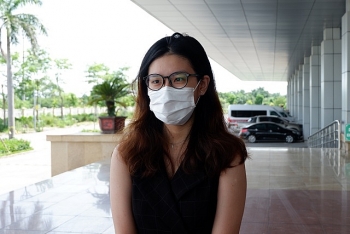 | Vietnamese returnee: ‘It’d have cost me a fortune if I had been in the US’ Ms. N.P.L, 19, known as “patient 323” in Vietnam, was surprised by the dedication of Vietnamese doctors during her treatment, saying she didn’t have to ... |
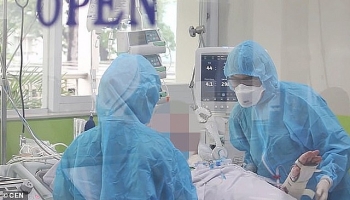 | International readers praise Vietnam’s efforts in saving British pilot COVID-19 patient In the latest update of the British pilot - known as “patient 91” in Vietnam - posted in the UK-based Daily Mail, Vietnam’s efforts in ... |
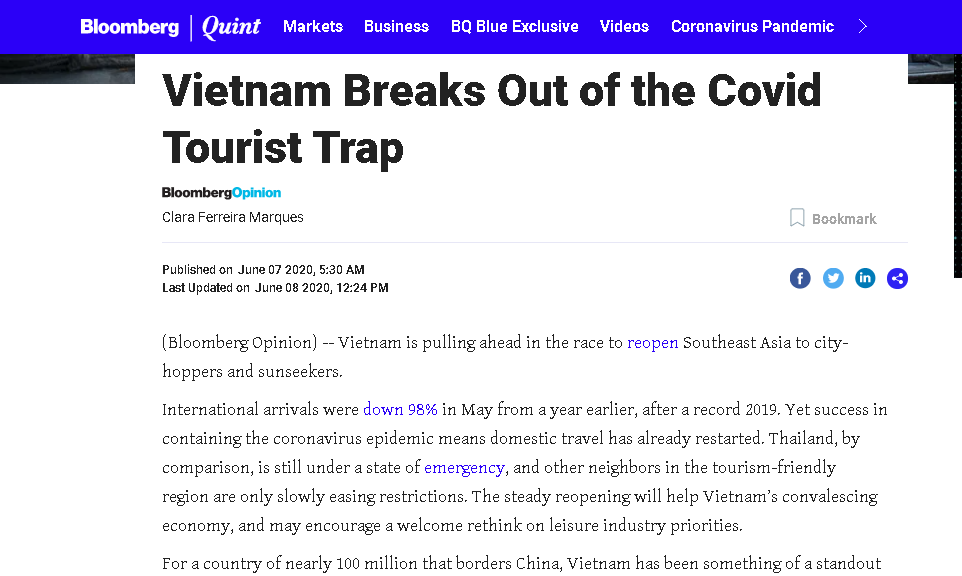 | Bloomberg speaks highly of Vietnam’s tourism trend post COVID-19 The US-based prestigious news outlet has recently run an article saying Vietnam’s success in COVID-19 containment meaning the country's domestic travel has already restarted. |
Recommended
 Handbook
Handbook
Vietnam Moves Up 8 Places In World Happiness Index
 Handbook
Handbook
Travelling Vietnam Through French Artist's Children Book
 Multimedia
Multimedia
Vietnamese Turmeric Fish among Best Asian Dishes: TasteAtlas
 Handbook
Handbook
From Lost to Found: German Tourist Thanks Vietnamese Police for Returning His Bag
 Handbook
Handbook
Prediction and Resolution for the Disasters of Humanity
 Handbook
Handbook
16 French Films To Be Shown For Free During Tet Holiday In Vietnam
 Handbook
Handbook
Unique Cultural and Religious Activities to Welcome Year of the Snake
 Handbook
Handbook

